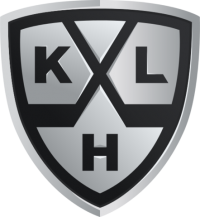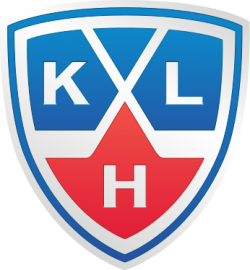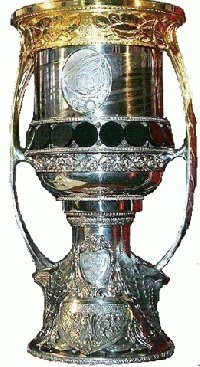Kontinental Hockey League
| Kontinental Hockey League | |
| 2022–23 KHL season | |

| |
| Sport | Ice hockey |
| Founded | 2008 |
| CEO | Alexander Medvedev |
| Motto | Хоккей – наша игра! Khokkey - nasha igra! (Hockey is our game!)[1] |
| No. of teams | 22 |
| Country(ies) | |
| Most recent champion(s) | |
| Most championship(s) | HC CSKA Moscow Ak Bars Kazan (3) |
| Official website | en.KHL.ru |
| Related competitions | Supreme Hockey League (VHL) Junior Hockey League (MHL) |
The Kontinental Hockey League (KHL) (Russian: Континентальная хоккейная лига, Kontinental'naya khokkeynaya liga) is an international professional ice hockey league in Eurasia founded in 2008. It comprises member clubs based in Russia (19), Belarus (1), Kazakhstan (1) and China (1) for a total of 22 clubs.
It was considered in 2015 to be the premier professional ice hockey league in Europe and Asia, and the second-strongest in the world behind North America's National Hockey League.[2][3] The KHL had in 2017 the highest total attendance in Europe with 5.32 million spectators in the regular season[4] and third-highest average attendance in Europe with 6,121 spectators per game in the regular season.[5] The Gagarin Cup is awarded annually to the league's playoff champion at the end of each season. The title of Champion of Russia is given to the highest-ranked Russian team.[6]
History
The league formed from the Russian Superleague (RSL) and the champion of the 2007–08 season of the second division, with 24 teams: 21 from Russia and one each from Belarus, Latvia, and Kazakhstan. The teams were divided into four divisions.
The start of the fourth season was overshadowed by the 2011 Lokomotiv Yaroslavl plane crash on 7 September 2011 in which almost all members of the team Lokomotiv Yaroslavl lost their lives shortly after take-off for their flight to their season-opening game in Minsk. The Opening Cup game in Ufa, which was already underway when news of the disaster arrived, was suspended. In memory of the disaster, 7 September remained a day of mourning on which no KHL regular-season games took place,[7] until after the 2017–18 KHL season. Journalist Vsevolod Kukushkin acted as the first press secretary for the league, after it evolved from the Superleague.[8]
After the 2022 Russian invasion of Ukraine, the National Hockey League suspended operation of its Memorandum of Understanding with the KHL.[9] An NHL memo instructed NHL teams to "immediately cease all dealings [direct or indirect] with the KHL and KHL Clubs [and all representatives of both], as well as with player agents who are based in and continue to do business in Russia."[9]
Team changes
2009–2014
In the 2009–10 season, Avtomobilist Yekaterinburg joined the KHL and Khimik Voskresensk was transferred to a lower league. In the 2010–11 season, Yugra Khanty-Mansiysk joined the league.
After several attempts by teams from Central Europe and Scandinavia to join the KHL, expansion beyond the borders of the former Soviet Union was finally realized in 2011. Lev Poprad, a newly founded team based in Poprad, Slovakia was admitted to the league. But after only one season, Lev was replaced by a team of the same name, Lev Praha, from Prague, Czech Republic, while Slovan Bratislava from Bratislava, Slovakia and Ukraine's Donbass from Donetsk joined the KHL as expansion teams for the 2012–13 season.[10] Lev and Slovan qualified for the playoffs in their first KHL season.
In 2013, Medveščak from Zagreb, Croatia, previously playing in the Austrian Hockey League, and Russian expansion team Admiral Vladivostok joined the league, thus expanding the league even further.[11] The league comprised 28 teams during the 2013–14 season, of which 21 were based in Russia and 7 located in the other countries.
In 2014, Finnish team Jokerit from Helsinki, Lada Togliatti (which previously played in the league), and newly created team HC Sochi joined the league.[12] However, HC Donbass did not play in the league for the 2014–15 season, due to the Russian intervention in Ukraine, but had intended to rejoin later.[13] Two other teams, Lev Praha and Spartak Moscow, also withdrew from the 2014–15 season due to financial problems.[14][15]
2015–2019
Prior to the 2015–16 season, Atlant Moscow Oblast withdrew from the KHL due to financial issues, while Spartak Moscow returned after a one-year hiatus.[16] The newly created Chinese club HC Kunlun Red Star from Beijing was admitted for the 2016–17 season.[17]
Prior to the 2017–18 season, Medveščak Zagreb withdrew from the league to rejoin the Austrian league and Metallurg Novokuznetsk was sent down to the VHL.[18]
After the end of the 2018–19 season, HC Slovan Bratislava withdrew from the KHL due to financial issues to rejoin the Slovak Extraliga.[19]
2020–present
On 24 February 2022, Finnish club Jokerit announced the team would withdraw from the league for the remainder of the season, including the playoffs, due to the 2022 Russian invasion of Ukraine.[20] On 27 February 2022, Latvian club Dinamo Riga announced that they too would withdraw for the same reasons.[21]
Season structure
Since 2009, the league is divided into East and West conferences. In the current season, each conference includes 14 teams divided into two divisions, 7 teams per division. During the regular season, each team plays 60 games: four games against each team in their own division, two games against each of the remaining teams in the same conference, one game against each team of the other conference and 8 extra games against selected opponents.
The eight top-ranked teams in each conference receive playoff berths. Within each conference quarterfinals, semifinals and finals are played before the conference winners play against each other for the Gagarin Cup. The division winners are seeded first and second in their conference, based on their regular season record. All playoff rounds are played as best-of-seven series. In each round, the top seeded remaining team is paired with the lowest seeded team etc.[16] In the playoffs, overtime periods last 20 minutes (or until a goal is scored). The number of overtime periods is not limited.
In the 2012–13 season, the Nadezhda Cup (Cup of Hope) was introduced, a consolation tournament for the teams who did not qualify for the playoffs. The winning team in the tournament wins the first overall pick in the KHL Junior Draft. The tournament is intended to extend the season and help maintain interest in hockey in the cities of these teams, and help players of national teams prepare for upcoming World Championship.
Players
Though now not as restrictive in maintaining an exclusively Russian composition of players and teams, Russian teams are still not allowed to sign more than five foreign players, while non-Russian teams must have at least five players from their respective country. Foreign goaltenders on Russian teams have a limit regarding total seasonal ice time.
Prior to the inaugural season, several KHL teams signed several players from the NHL.[19] A dispute between the two leagues over some of these signings was supposed to have been resolved by an agreement signed on July 10, 2008, whereby each league would honor the contracts of the other, but the signing of Alexander Radulov was made public one day after the agreement (though it was actually signed two days prior to the agreement taking effect),[20] leading to an investigation by the International Ice Hockey Federation.[21] On October 4, 2010, the conflict between the leagues was settled when both signed a new agreement to honor one another's contracts.
The league set up rules for the NHL lockout which lasted from 16 September 2012 to 12 January 2013. According to the special regulations, each KHL team was allowed to add up to three NHL players to its roster, among them at most one foreign player. More than 40 NHL players, the majority of them Russians, played in the KHL during the lockout.
KHL players are represented by the Kontinental Hockey League Players' Trade Union.
History
Founding (2008)
The KHL was founded in 2008 with 24 teams, the 20 teams from the last season of the Russian Superleague as well as the champion of the 2007–08 season of the second division. In addition, one team each from Latvia, Belarus and Kazakhstan were included. The teams were divided into 4 divisions, based on the performance in previous seasons. The first season got under way on 2 September 2008 and ended in April 2009 with Ak Bars Kazan becoming the first ever winner of the Gagarin Cup.
Introduction of conferences (2009)
In an effort to reduce the large travel distances for the teams, the second season saw the introduction of two conferences (East and West) and the re-alignment of the divisions according to geographical criteria. Despite efforts to expand the league to Central and Western Europe, only minor changes in the compositions of the Russian teams happened in the first three seasons. In the Gagarin Cup finals, teams from the East dominated with Ak Bars Kazan winning twice and Salavat Yulaev Ufa once.
Yaroslavl air disaster (2011)
The start of the fourth season was overshadowed by the Yaroslavl air disaster on 7 September 2011 in which almost the entire team of Lokomotiv Yaroslavl was killed shortly after take-off for their flight to their season opening game in Minsk. The Opening Cup game in Ufa, which was already under way when news of the disaster arrived, was abandoned and the start of the season postponed by five days. Lokomotiv Yaroslavl was forced to withdraw from the KHL season, but later played part of the VHL season and returned to the KHL in 2012.
Expansion to Central Europe (2011 and 2012)
After several failed attempts of teams from Central Europe and Scandinavia to join the KHL, expansion beyond the borders of the former Soviet Union was finally realized in 2011. Lev Poprad, a newly founded team based in Poprad, Slovakia was admitted to the league. Lev failed to reach the play-offs, but managed to draw considerable interest and sold out many of their home matches. For the 2012–13 season, Lev is replaced by a team of the same name, Lev Praha, from Prague, Czech Republic, while Slovan Bratislava from Slovakia and Ukraine's HC Donbass join the KHL.[22]
Seasons overview
| Season | Gagarin Cup Winner | Gagarin Cup finalist | Continental Cup Winner | Top scorer |
|---|---|---|---|---|
| 2008–09 | ||||
| 2009–10 | ||||
| 2010–11 | ||||
| 2011–12 | ||||
| 2012–13 | ||||
| 2013–14 | ||||
| 2014–15 | SKA Saint Petersburg | Ak Bars Kazan | CSKA Moscow (139 points) | Alexander Radulov (71 points: 24 G, 47 A) |
| 2015–16 | Metallurg Magnitogorsk | CSKA Moscow | CSKA Moscow (127 points) | Sergei Mozyakin (67 points: 32 G, 35 A) |
| 2016–17 | SKA Saint Petersburg | Metallurg Magnitogorsk | CSKA Moscow (137 points) | Sergei Mozyakin (85 points: 48 G, 37 A) |
| 2017–18 | Ak Bars Kazan | CSKA Moscow | SKA Saint Petersburg (138 points) | Ilya Kovalchuk (63 points: 31 G, 32 A) |
| 2018–19 | CSKA Moscow | Avangard Omsk | CSKA Moscow (106 points) | Nikita Gusev (82 points: 17 G, 65 A) |
| 2019–20 | Cancelled due to the COVID-19 pandemic | CSKA Moscow (94 points) | Vadim Shipachyov (65 points: 17 G, 48 A) | |
| 2020–21 | Avangard Omsk | CSKA Moscow | CSKA Moscow (91 points) | Vadim Shipachyov (66 points; 20 G, 46 A) |
| 2021–22 | CSKA Moscow | Metallurg Magnitogorsk | Not determined | Vadim Shipachyov (67 points: 24 G, 43 A) |
| 2022–23 | CSKA Moscow | Ak Bars Kazan | SKA Saint Petersburg (105 points) | Dmitrij Jaškin (62 points: 40 G, 43 A) |
*: In the first season, Salavat Yulaev Ufa was the winner of the regular season, but the Continental Cup was not yet awarded.
Trophies and awards
The winner of the playoff is awarded the Gagarin Cup, the KHL Champion title and the Russian Champion title, regardless of the country the club represents. The team ranked first in the standings after the regular season, i.e. the winner of the regular season, is awarded the Continental Cup[23] (Russian: Кубок Континента, Kubok Kontinenta). The winners of the conference finals are awarded the Eastern Conference Champion Cup (Russian: Кубок Победителю конференции Восток, Kubok Pobeditelyu konferentsii Vostok) and the Western Conference Champion Cup (Russian: Кубок Победителю конференции Запад, Kubok Pobeditelyu konferentsii Zapad).[24]
The KHL also awards the Opening Cup annually to the winner of the first game between the Gagarin Cup winner and the runner-up of the previous season. On September 10, 2011, three days after the 2011 Lokomotiv Yaroslavl air disaster, the KHL head office decided to honor the deceased in the 2011 Opening Cup.[25]
| Season | Opening Cup Winner | Nadezhda Cup Winner | Gold Stick Award (MVP) |
|---|---|---|---|
| 2008–09 | not contested | ||
| 2009–10 | |||
| 2010–11 | |||
| 2011–12 | |||
| 2012–13 | |||
| 2013–14 | Sergei Mozyakin | ||
| 2014–15 | Metallurg Magnitogorsk | Cancelled due to economic reasons | Alexander Radulov |
| 2015–16 | CSKA Moscow | Not contested | Sergei Mozyakin |
| 2016–17 | Metallurg Magnitogorsk | Not contested | Sergei Mozyakin |
| 2017–18 | SKA Saint Petersburg | Not contested | Justin Azevedo |
| 2018–19 | SKA Saint Petersburg | Not contested |
All-time team records
Since its foundation in 2008, 35 different clubs have played in the KHL, and 32 of them have at least once qualified for the playoffs. Of the 24 founding teams, only Metallurg Novokuznetsk and Khimik Voskresensk had never qualified for the playoffs (both are no longer in the league). The table gives the final regular-season ranks for all teams, with the playoff performance encoded in colors. The teams are ordered by their best championship results.
|
| |||||||||||||||||||||||||||||||||||||||||||||||||||||||||||||||||||||||||||||||||||||||||||||||||||||||||||||||||||||||||||||||||||||||||||||||||||||||||||||||||||||||||||||||||||||||||||||||||||||||||||||||||||||||||||||||||||||||||||||||||||||||||||||||||||||||||||||||||||||||||||||||||||||||||||||||||||||||||||||||||||||||||||||||||||||||||||||||||||||||||||||||||||||||||||||||||||||||||||||||||||||||||||||||||||||||||||||||||||||||||||||||||||||||||||||||||||||||||||||||||||||||||||||
[a]: Includes record of Dynamo Moscow before the merger with HC MVD in 2010
[b]: Did not participate in the 2011-12 season due to the deadly air disaster on September 7, 2011, that killed the entire team
References
- ↑ "Новый игровой ролик КХЛ "Пробка"" (in Russian). khl.ru. http://www.khl.ru/video/1295/. Retrieved 2010-08-16.
- ↑ "World of difference for KHL?". iihf.com. 7 May 2012. http://www.iihf.com/home-of-hockey/news/news-singleview/?tx_ttnews%5Btt_news%5D=6876&cHash=60f30f7f072dfbdf8e5b4c471559f28f.
- ↑ "Ranking the Top Ten Hockey Leagues". 10 January 2015. http://thehockeywriters.com/ranking-the-top-ten-hockey-leagues/.
- ↑ "Хоккей. КХЛ. Регулярный чемпионат 2016/2017 – Факты". https://www.championat.com/hockey/_superleague/1770/tournir/info.html.
- ↑ "KHL is on the 3rd place by attendance". http://www.iihf.com/home-of-hockey/news/attendance-2016-2017/.
- ↑ "About the KHL". khl.ru. http://en.khl.ru/official/22007/.
- ↑ "Day of Remembrance in honor of Lokomotiv". 7 September 2013. http://en.khl.ru/news/2013/09/07/25234.html.
- ↑ Template:Cite magazine
- ↑ 9.0 9.1 Schram, Carol. "NHL Suspends Dealings With KHL As Russia's Ukraine Invasion Impacts Hockey World". https://www.forbes.com/sites/carolschram/2022/03/08/nhl-suspends-dealings-with-khl-as-russias-ukraine-invasion-impacts-hockey-world/.
- ↑ "Lev from Slovakia to Prague". IIHF.com. 30 March 2012. http://www.iihf.com/en/home-of-hockey/news/news-singleview/recap/6557.html.
- ↑ "Medveščak to join the league from 2013–14 season". khl.ru. 29 April 2013. http://www.khl.ru/news/2013/04/29/128623.html.
- ↑ "Welcome, Jokerit and Sochi; welcome back, Lada". 30 April 2014. http://en.khl.ru/news/2014/04/30/27837.html.
- ↑ "Donbass to miss 2014–15 season". 19 June 2014. http://en.khl.ru/news/2014/06/19/27872.html.
- ↑ "Naděje vyhasla. Lev Praha definitivně končí v KHL". 1 July 2014. http://sport.aktualne.cz/nadeje-vyhasla-lev-praha-definitivne-konci-v-khl/r~d296cb2a011e11e4a60c0025900fea04/.
- ↑ "У министра конструктивная позиция по легионерам", 22 April 2014.
- ↑ "League confirms format for 2015–16 season". https://en.khl.ru/news/2015/06/17/235081.html.
- ↑ KHL (25 June 2016). "It's Official! Kunlun Red Star joins the KHL". en.KHL.ru. http://en.khl.ru/news/2016/06/25/308626.html.
- ↑ "League confirms list of participant clubs for 2017–18 Championship". Khl. 25 May 2017. http://en.khl.ru/news/2017/05/25/347804.html.
- ↑ "Slovan Bratislava officially leaves KHL", Eurohockey.com.
- ↑ "Finnish club leaving KHL ahead of playoffs amid Russian invasion of Ukraine", Yahoo! Sports, 24 February 2022.
- ↑ "Latvia's Dinamo Riga withdraws from KHL amidst Ukraine invasion". p. 1. https://www.sportsnet.ca/hockey/article/latvias-dinamo-riga-withdraws-from-khl-amidst-ukraine-invasion/.
- ↑ "Lev from Slovakia to Prague". IIHF.com. 2012-03-30. http://www.iihf.com/en/home-of-hockey/news/news-singleview/recap/6557.html.
- ↑ "Ufa’s first trophy". khl.ru. http://en.khl.ru/news/2010/3/5/23808.html. Retrieved 5 March 2010.
- ↑ "Новые трофеи Лиги". khl.ru. http://www.khl.ru/news/2010/3/4/26511.html. Retrieved 4 March 2010.
- ↑ "Официальное заявление КХЛ : Континентальная Хоккейная Лига (КХЛ)". http://www.khl.ru/news/2012/09/05/43922.html. Retrieved 13 May 2015.
External links
- www.khl.ru - Official homepage. (Russian language)
- en.khl.ru - Official homepage. (English language)
- Official KHL Store
- KHL All Stars Game
- KHL vs NHL exhibition games official homepage
- KHL news and stats from Eurohockey
- Kontinental Hockey League Players' Trade Union
| This page uses Creative Commons Licensed content from Wikipedia (view authors). |

